News & Media
How to survive and thrive in an ever-changing dynamic environment
An event that is thoroughly African—this was how Prof Mandla Makhanya, Principal and Vice-Chancellor of Unisa, described the second Strategic Risk Leadership Conversations in Higher Education (SRLC-HE) 2018, held by the university on 5 and 6 December 2018.
He based his description on four of the features of SRLC-HE. “It is premised on storytelling, which is one of our basic tenets of African origins and tradition. It is cloaked with an inspirational flair, in that speakers will be adopting a posture that seeks to depict the future as a ‘tangible reality’ rather than an elusive concept.
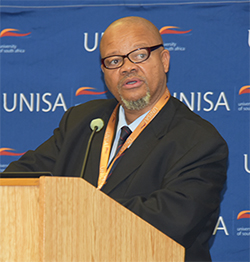
Prof Mandla Makhanya (Principal and VC) |
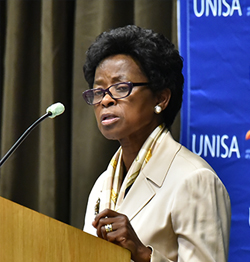
Dolly Mokgatle (Chairperson: AERMCoC, Unisa Council) |
“The theme itself is deeply strategic, pointing to the fluidity of the terrain that organisational leadership across sectors and industries have to navigate. And, lastly, it encapsulates the key issues undergirding the AU Agenda 2063’s seven pillars, which revolve around good governance, unity in pursuit of sustainable growth, a humane approach that seeks to empower women and children, and globally oriented partnerships.”
Quoting Girma Shimelis Muluneh and Matebe Tafere Gedifew, the VC said that building an adaptive university capable of deep and pervasive change was not a matter of choice; rather, it was a necessity to survive and thrive in an ever-changing dynamic environment.
He hoped that the deep reflections and frank deliberations of SRLC-HE would drive that “pervasive change” so that the higher education sector could truly mitigate the country’s socioeconomic challenges.
“We believe that it is indeed within our reach to make an extraordinary impact. It begins with ‘me’ and ‘you’. Collectively, we can heighten Africa’s stature for the whole world to see and admire!”
The revolution of technology
Dolly Mokgatle, Chairperson of the Audit, Enterprise and Risk Management Committee of Council (AERMCoC), delivering the Unisa Council perspective on HE, spoke on the access to technology and how it changes lives. “My belief is that never before has the world and South Africa been exposed to the risk of revolution such as the revolution we are facing today, and that is the revolution of technology.”
She took the audience on a whistle-stop tour of Africa, touching down in Ethiopia, Tanzania, Kenya, Nigeria, Ghana, Senegal, and Zambia, and painting a fairly gloomy picture of the challenges that HE faces across the continent.
Back in SA, she said that the question the Unisa Council was tempted to ask “is whether, as the leading distance learning education provider on the continent, we have sufficiently seized the advantages that come with digitisation. How far are we from realising our own ideals of open, distance, and e-learning (ODeL)?”
“We must remember why we are doing this,” she urged. “We are doing this because we want to give more and better access to information and knowledge for our students.”
Interconnectivity is critical to what we do, Mokgatle concluded. HE needs to develop people and skills with strategic agility to take our university and our country to the next level.
Fast forward 45 years to the pracademy
Prof Peter Goss, Director and Executive Consultant, Peter Goss (Pty) Ltd, queried whether HE was responding to the aspirations of the 2063 African Agenda. The digital economy, he said, needed “pracademics”, academics who could empower people to do and to think practically. This has to be the direction of the future, he counselled, with an emphasis shift from knowledge to skills, job to career, and employee to employer.
Although it flies in the face of academia right now, the future academic, Goss said, should be “a pracademic, who must:
- Have knowledge, skills and experience
- Be a corporate, civil society and public sector-insightful leader
- Be a writer, researcher, and thought leader who integrates and balances
- models
- theories
- frameworks
- process
with practice and the needs of the economy and society
- Be well-networked, connected with commerce, industry, and other sectors
- Create, innovate in relation to, and facilitation of, markets access.”
The future is Pan African, inclusive, and, through distance education, has no need of bricks and mortar anymore, Goss concluded.
Walk like a plastic chameleon
Chief Mabizela, Chief Director of Higher Education Policy in the Department of Higher Education (DHET), was perhaps not as convinced as Goss that the brick-and-mortar university was dying. He took the audience back to the ninth century CE, and the birth of universities in Morocco and Egypt, saying that the institution had stood the test of time and proved its resilience through the years. There was no reason to believe that it was about to fail now or in the future, since, like a chameleon, it had adapted to a changing universe.
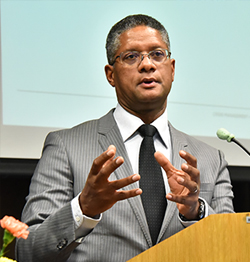
Prof Peter Goss (Managing Director: Peter Goss Pty (Ltd) |
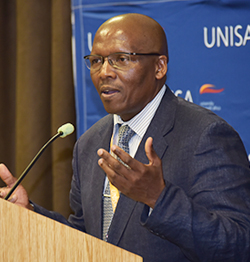
Chief Mabizela (Chief Director: Higher Education Policy, DHET) |
Quoting André Keet’s analogy of a “plastic university”, he said that “the ‘origin’ of the university, from which it has detached itself, is plastic: flexible, with an inscribed transformative ability rooted in the ‘nature’ of the knowledge and the disciplines with which it works. The university’s essence is transformability.”
Mabizela did concede, however, that the university was faced with its fiercest challenge in the form of the fusion of technologies that was blurring the lines between the physical, digital and biological spheres—collectively known as the cyber-physical systems—and generally referred to as the Fourth Industrial Revolution (4IR).
Extending his analogy, he said that, unlike a chameleon and more like plastic, the university needed to adapt fast. “Strategic challenges and the evolutionary fluidity of the context demand adaptable strategies, policies, and institutions of higher learning which simultaneously contribute to resolution of pertinent challenges.”
Moreover, he said, the university was challenged to produce graduates that relate and drive the cyber-physical system whilst simultaneously adapting to the same environment. “If the university does not poise itself to address itself to these challenges, it seriously faces irrelevance in the not so distant future,” concluded Mabizela.
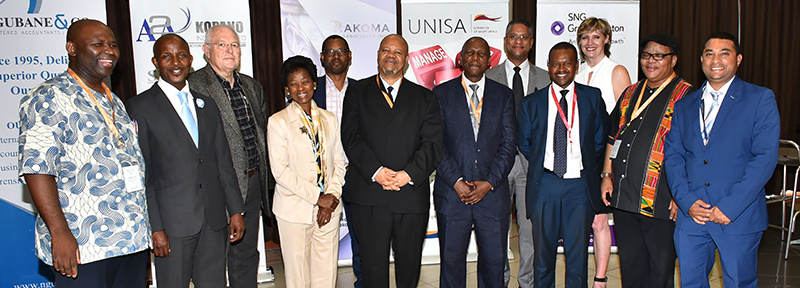
Speakers and panellists: Dr Somadoda Fikeni (Director: VC Projects and Advisor to the Principal), Thabiso Ramasike (Executive Chairman: Tuleka Group (Pty) Ltd and Member of Unisa Council), Prof Alwyn Louw (President: Monash University, SA), Dolly Mokgatle (Chairperson: AERMCoC, Unisa Council), Prof Khehla Ndlovu (VP: Strategy, Risk, and Advisory Services), Prof Mandla Makhanya (Principal and VC), Chief Mabizela (Chief Director: Higher Education Policy, DHET), Prof Peter Goss (Managing Director: Peter Goss Pty (Ltd), Sikhuthali Nyangintsimbi (Director: Enterprise Risk Management, Unisa), Dr Thelma Louw (Deputy Director: Sustainability Office, Risk and Compliance, Unisa), Prof Themba Mosia (Chairperson: CHE), and Yashwin Singh (Acting Executive Director: Risk and Compliance, Unisa)
A panel discussion between Prof Themba Mosia, Chairperson of the Council for Higher Education (CHE); Prof Alwyn Louw, President of Monash University, South Africa; Thabiso Ramasike, Chairperson of Finance, Investments, and Estates Committee of Council (FIECoC), and also Executive Chairman of Tuleka Group (Pty) Ltd; and Dr Somadoda Fikeni, Director of VC Projects and Advisor to the Principal, Unisa, followed.
A sense of resilience and strategic agility
The second day of the conversation was as inspirational as the first.
Speaking on the ODeL journey through cyber space and its key milestones, critical challenges, and untapped lessons, Tumediso Lobelo, Founder and CEO of Tulo Vation, said that HE institutions should be at the forefront of new careers. She said that 65% of today’s students would move into careers that had not been created yet, concluding that we need a sense of resilience and strategic agility.
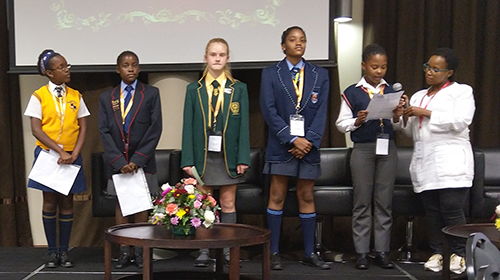
The Girls: Didintle Mokgoko (Banareng Primary School), Tuso Gurumani (Rainbow Education Centre), Mila Snyman (Laerskool Garsfontein), Joy Miketa Mokadi (Lerato House), and Doobsie Joni (Sefako Mapogo Makgatho Primary School) It begins with ‘you’ and ‘me’Sikhuthali Nyangintsimbi, Director of Enterprise Risk Management, Unisa, defined the role of The Girls at SRLC-HE as follows: These young women were chosen to represent the future leadership of South Africa, premised on aspirational flair and inclusive diversity. Their articulation of the Concept Note for the event was a way of sensitising the current leadership that the notion of the next generation is actually real and tangible. They were here to listen to our conversations as we grapple with the future and take decisions that will shape such future, a future that will be owned by The Girls—and their broader generation. In a sense, they were also holding us accountable, first by setting the tone for the event and then through being part of the conversations about the future landscape. |
*By Sharon Farrell and Tshimangadzo Mphaphuli
Publish date: 2018-12-12 00:00:00.0

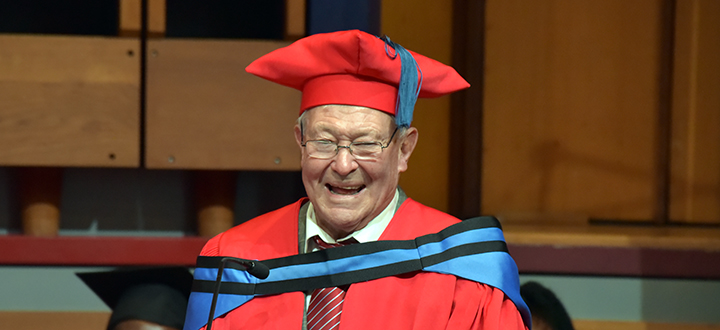 Community champion and agricultural entrepreneur extraordinaire honoured by Unisa
Community champion and agricultural entrepreneur extraordinaire honoured by Unisa
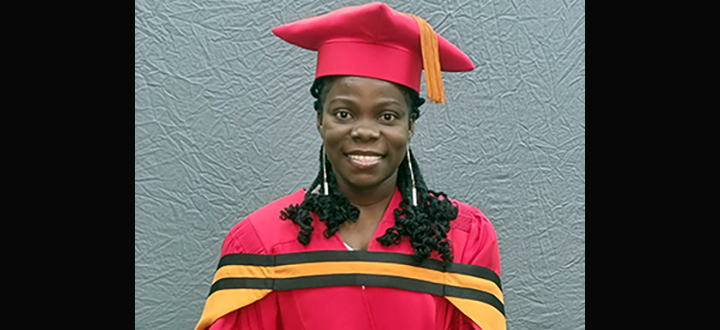 Ghanaian-born Swede earns PhD in Information Sciences from Unisa
Ghanaian-born Swede earns PhD in Information Sciences from Unisa
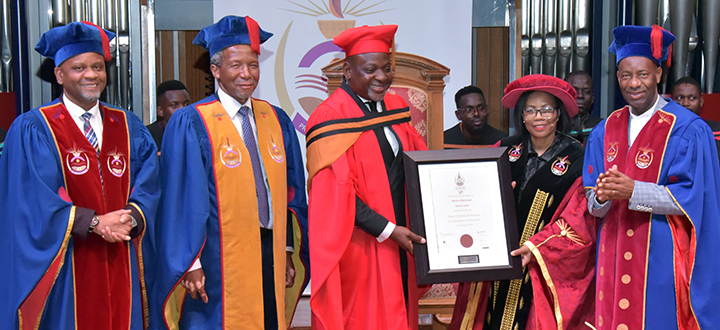 Unisa awards honorary doctorate to exemplary philanthropist and entrepreneur Collen Tshifhiwa Mashawana
Unisa awards honorary doctorate to exemplary philanthropist and entrepreneur Collen Tshifhiwa Mashawana
 Inhlanyelo Hub explores financing and sustainability at the International Conference on Business Incubation
Inhlanyelo Hub explores financing and sustainability at the International Conference on Business Incubation
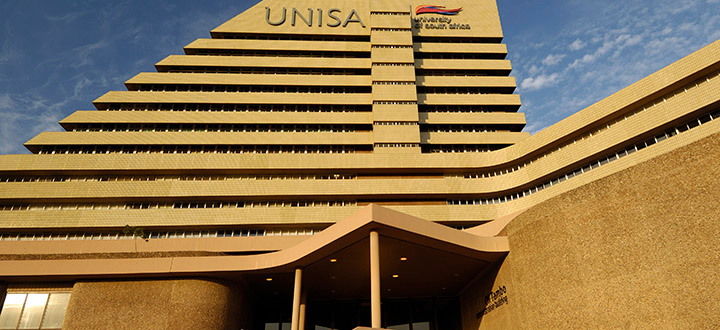 Unisa remains anchored among the waves
Unisa remains anchored among the waves